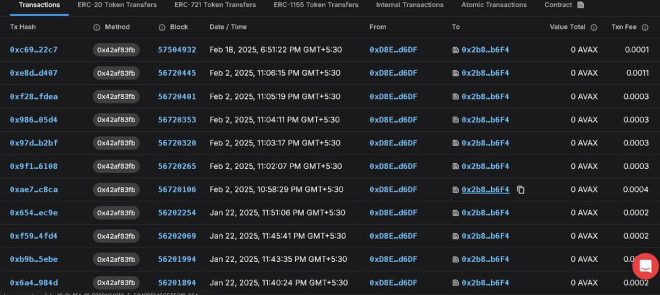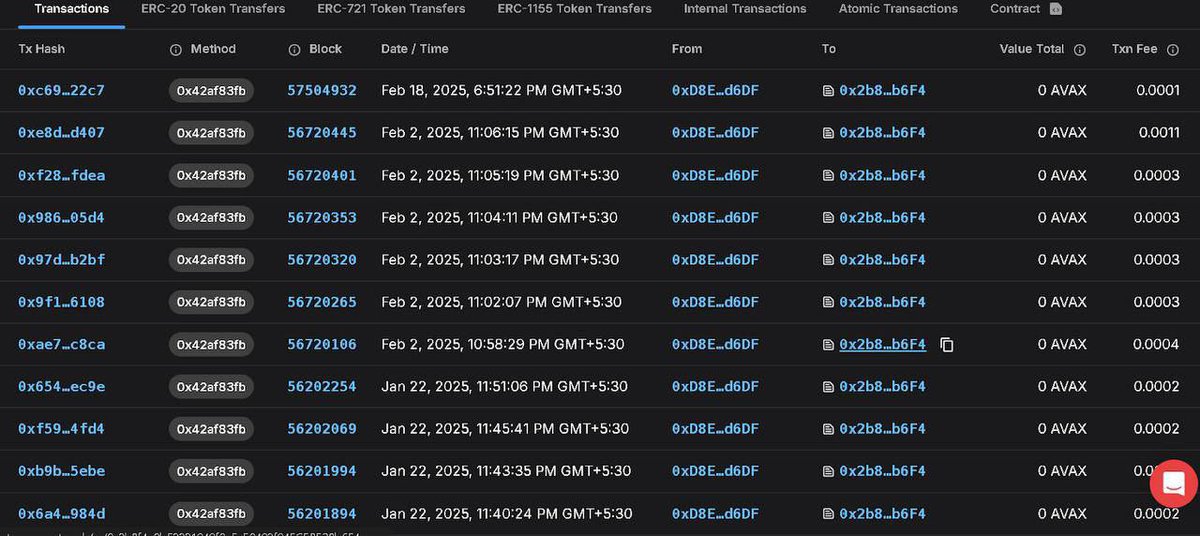
India’s Groundbreaking Digitization of Land Records in Dantewada District
In a significant move towards modernizing its land record system, India’s Dantewada District has successfully digitized over 700,000 land records utilizing the Avalanche ($AVAX) blockchain. This initiative is hailed as a monumental step towards ensuring transparency and security in land management. The digitization of land records not only aims to streamline the process of land ownership but also enhances the integrity of the data stored.
Understanding the Importance of Land Record Digitization
The digitization of land records plays a crucial role in a country’s development, particularly in agricultural and rural areas. By moving from traditional paper-based systems to a blockchain-based solution, the government of India is addressing various challenges including:
- Transparency: By utilizing blockchain technology, the records become immutable and transparent, reducing the risk of fraud and disputes over land ownership.
- Security: Digital records on a blockchain are less susceptible to tampering or loss compared to paper records, which can be damaged or destroyed.
- Accessibility: Digitized records can be accessed more easily by the public and relevant authorities, facilitating smoother transactions and land management processes.
The Role of Blockchain Technology in Land Management
Blockchain technology is gaining traction for its capacity to securely store and manage data across a distributed network. In the context of land records, blockchain provides several advantages:
- Decentralization: Traditional land records are often controlled by a single entity, making them vulnerable to corruption or mishandling. Blockchain decentralizes this control, distributing the data across a network that is secure and transparent.
- Smart Contracts: These self-executing contracts with the terms of the agreement directly written into code can automate processes related to land transfers, making transactions more efficient and reducing the potential for disputes.
- Traceability: Blockchain allows for the complete history of a property to be recorded, providing a clear and trustworthy lineage of ownership which can be invaluable during disputes or sales.
Dantewada’s Landmark Initiative
Dantewada District, located in the state of Chhattisgarh, has taken a bold step by integrating blockchain technology into its land management system. This initiative reflects the district’s commitment to leveraging technology for governance and public service delivery. The digitization process involved meticulous data entry and verification, ensuring that over 700,000 land records are accurate and reliable.
- YOU MAY ALSO LIKE TO WATCH THIS TRENDING STORY ON YOUTUBE. Waverly Hills Hospital's Horror Story: The Most Haunted Room 502
According to reports, the integration with the Avalanche blockchain enhances the security and scalability of the records. Avalanche is recognized for its high throughput and low latency, making it an ideal platform for handling large datasets such as land records. The choice of $AVAX blockchain not only showcases innovative thinking but also positions Dantewada at the forefront of digital governance in India.
Implications for Land Ownership and Farmers
For farmers and landowners in Dantewada, this digitization initiative is expected to have a transformative impact. Some of the anticipated benefits include:
- Reduced Corruption: With a transparent and secure system in place, the chances of land-related corruption are significantly minimized, fostering trust among the landowners and the government.
- Easier Access to Loans: Digitized land records can facilitate easier access to credit for farmers, as financial institutions can quickly verify land ownership and value.
- Dispute Resolution: The clarity and accuracy of digitized records can lead to quicker resolutions of land disputes, which are common in rural areas.
Challenges and Future Prospects
While the digitization of land records in Dantewada is a monumental achievement, it is essential to acknowledge the challenges that may accompany such initiatives. Some potential hurdles include:
- Digital Literacy: Ensuring that all stakeholders, including farmers and local authorities, are equipped with the necessary digital literacy skills to navigate the new system.
- Infrastructure: Adequate technological infrastructure must be in place to support the digitization process and ensure consistent access to the blockchain network.
- Continuous Updates: Maintaining the accuracy of land records will require ongoing efforts to update and verify information as changes occur.
Conclusion
The digitization of over 700,000 land records in Dantewada District using the Avalanche blockchain marks a significant stride toward enhancing transparency, security, and efficiency in land management. This initiative not only serves as a model for other regions in India but also highlights the potential of blockchain technology in transforming governance and public service delivery. With the right support and infrastructure, Dantewada’s landmark initiative could pave the way for a more secure and efficient land management system, ultimately benefiting farmers and landowners across the region.
As India continues to embrace digital solutions for governance, the successful implementation of this project in Dantewada may inspire similar initiatives throughout the country, furthering the goal of a transparent and equitable land management system for all.

BREAKING:
INDIA’S DANTEWADA DISTRICT HAS
DIGITIZED 700,000+ LAND RECORDS
ON $AVAX BLOCKCHAIN TO ENSURE
TRANSPARENCY AND SECURITY.THIS IS MASSIVE !!! pic.twitter.com/kFCr5uO6Ct
— Ash Crypto (@Ashcryptoreal) March 7, 2025
BREAKING:
INDIA’S DANTEWADA DISTRICT HAS DIGITIZED 700,000+ LAND RECORDS ON $AVAX BLOCKCHAIN TO ENSURE TRANSPARENCY AND SECURITY.
THIS IS MASSIVE !!!
Introduction to Blockchain in Land Records
In a groundbreaking move, India’s Dantewada district has taken a giant leap into the future by digitizing over 700,000 land records using the $AVAX blockchain. This initiative stands to revolutionize how land records are maintained, accessed, and secured. It’s a significant step toward modernizing land governance in the region, promoting transparency and security like never before.
The Importance of Digitizing Land Records
Land records are vital for property ownership, legal transactions, and ensuring that citizens have clear titles to their land. Unfortunately, traditional land record systems often suffer from inefficiency, lack of transparency, and vulnerability to fraud. By digitizing these records on a blockchain platform, Dantewada is addressing these issues and paving the way for a more reliable system.
What is Blockchain Technology?
Blockchain technology is essentially a decentralized ledger that records transactions across many computers so that the record cannot be altered retroactively without the alteration of all subsequent blocks and the consensus of the network. In simpler terms, it’s a secure and transparent way to store data. In the case of land records, this means that once a record is entered into the blockchain, it becomes immutable and can be easily accessed by authorized individuals.
How $AVAX Blockchain Enhances Security
By utilizing the $AVAX blockchain, Dantewada district ensures that each land record is not only secure but also easily verifiable. The decentralized nature of blockchain eliminates the risk of central points of failure, which can be a major concern in traditional systems. With a blockchain, every transaction is recorded in a way that is tamper-proof, thus significantly reducing the risk of fraudulent activities.
Benefits of Digitization for Residents
The digitization of land records in Dantewada brings a host of benefits for local residents. For one, it dramatically speeds up the process of verifying land ownership. Gone are the days of sifting through piles of paperwork and waiting in long queues at government offices. Now, individuals can access their land records online, making transactions quicker and more efficient.
Moreover, this move fosters greater transparency. Residents can verify land ownership and transaction histories, reducing disputes and enabling more secure property transactions. This is especially crucial in a country like India, where land disputes are common and can lead to costly legal battles.
Challenges and Considerations
While the digitization of land records is a commendable step, it’s essential to recognize the challenges that may arise. For instance, not all residents may have access to the necessary technology or the internet to view their land records online. It will be vital for the government to ensure that digital literacy programs are in place to help residents navigate this new system.
The Role of Government and Stakeholders
The implementation of this project reflects a commitment from the government of India to modernize land administration. It’s a collaborative effort that requires input and support from various stakeholders, including local governments, technology providers, and the community. Engaging these stakeholders is crucial for the successful adoption of the new system.
Future Implications for Land Management
What’s happening in Dantewada could set a precedent for other districts in India. With over 700,000 land records now digitized, it’s a shining example of how technology can transform governance. If successful, this model could be replicated across the nation, ultimately resulting in a more efficient and transparent land management system.
International Perspectives on Land Record Digitization
Looking beyond India, many countries are also exploring the digitization of land records. Countries like Sweden and Georgia have successfully implemented similar systems, resulting in improved property rights and decreased disputes. The global trend is leaning towards utilizing technology to enhance land governance, and India’s initiative in Dantewada aligns perfectly with this movement.
Community Response and Engagement
As this news spreads, the excitement among the local community is palpable. Residents are hopeful that this digitization will empower them and simplify property transactions. Community engagement will be crucial in ensuring that the system meets the needs of its users. Feedback from residents will help identify any shortcomings early on, allowing for timely adjustments to the system.
Conclusion: A New Era of Land Management in India
The digitization of land records in Dantewada district is more than just a technological advancement; it’s a step towards ensuring justice, security, and transparency for landowners. By integrating blockchain technology into the land administration system, India is not only modernizing its processes but also setting a standard for other nations to follow. As the world watches this development unfold, it’s clear that this initiative could change the landscape of property rights in India forever.
In this digital age, such innovative solutions reflect the potential of blockchain technology to solve real-world problems. The success of this project could usher in a new era, where land ownership is clear, disputes are minimized, and citizens can confidently engage in property transactions. The future of land management in India looks promising, and it all starts in Dantewada.
“`
